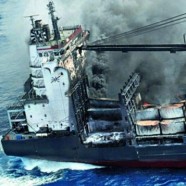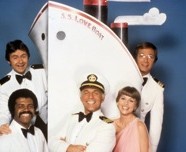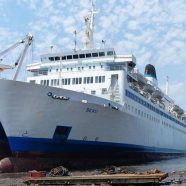Alang in the Lot
They work without masks, without gloves, shirtless, and with cigarettes in their mouths, making skin contact with the poisonous fumes they abundantly inhale. This is neither in Alang (India) nor in Bangladesh; it is at Laval-de-Cère, a town bordering the Massif Central, at the edges of the Cère, a tributary of the Dordogne. For ten years, Sidénergie has been transforming creosoted railway sleepers into coal for barbecue, thanks to a waiver granted by the French Superior Council of Public Hygiene.
Obama, Hollande and Elephants
Since early September the United States announced that they would carry out on October 8 the destruction of 5.4 tonnes of illegal ivory confiscated over the last 25 years on their soil. This destruction is in line with an Executive Order by President Obama on July 1, 2013 on Combating Wildlife Trafficking. In this light the United States has launched a national and international programme aimed at stopping “slaughter commissioned by armed and organized criminal Syndicates.” This constitutes a formidable task.
Hansa Brandenburg: another container ship riddled with Problems
On July 15th 2013 a fire broke out onboard the Hansa Brandenburg (IMO 9236236), a container ship 176 m in length with a capacity of 1,740 TEU (Twenty-foot Equivalent Unit) operating under the Liberian flag. The ship was sailing from Singapore to Durban (South Africa) and was located 200 miles off the coast of Mauritius. The crew of 17 was unable to extinguish the fire that continued to spread. Another container ship, the Donau Trader, deviated to rescue the crew and bring them safely to Port Louis in Mauritius. The burning ship drifted for several days until the fire was brought under control by Five Oceans Salvage and Smit Salvage on July 19th. The Hansa Brandenburg was towed towards Port Louis after permission was granted for assessment and potential repairs to be carried out.
Costa Concordia – Press Release #6
Press Release #6
Tomorrow, at any point during the hours-long raising of the wreckage, the cruise ship containing 50,000 tons of scrap, waste, and polluted water could split open like an old, cracked bathtub. While the Costa Concordia is now in a relatively confined area, tomorrow this dump could be spread out over the Island of Giglio, and the Mediterranean sea. The only reassuring thing is that the wreck has been drained of its propulsion fuel. For the past 19 months, the hull of the Costa Concordia has been subject to the corrosion caused by waves and offshore currents. Therefore, there is a pressing risk of pollutant dispersal.
Costa Concordia – Press Release #6
Press Release #6
Tomorrow, at any point during the hours-long raising of the wreckage, the cruise ship containing 50,000 tons of scrap, waste, and polluted water could split open like an old, cracked bathtub. While the Costa Concordia is now in a relatively confined area, tomorrow this dump could be spread out over the Island of Giglio, and the Mediterranean sea. The only reassuring thing is that the wreck has been drained of its propulsion fuel. For the past 19 months, the hull of the Costa Concordia has been subject to the corrosion caused by waves and offshore currents. Therefore, there is a pressing risk of pollutant dispersal.
Ship-breaking kills in Turkey
Despite rumors praising safety in the shipbreaking yards of Turkey, work conditions there are still bad. Two workers intoxicated in the machine rooms of the ex-Pacific Princess have just payed for those conditions with their lifes.
The ex-Love Boat from the television series of the same name was sold to a turkish demolition yard in april 2012 for the price of $260 per ton. The Pacific Princess was evaluated at 8.000 tons. The buyer took over a year to finish paying. The ex-Pacific Princess left the Genoa Harbor on July 27th 2013 towed by the Izmir Bull under the name Acif. It had arrived in Genoa in november 2008 for renovation and technical compliance, but such work was soon abandoned. Built in 1971, the ship holds large quantities of asbestos ans PCBs. Its last known owner is the Quail Cruises Ship Management based in Madrid.
Shipbreaking # 32
The 32nd bulletin of information and analysis on Ship-breaking is published (75 pages). It covers the month of May, June and July 2013. In 8 years, the ship-breaking bulletin has become a reference in this field across the globe. Information and photographs are sent to Robin des Bois by regular or occasional correspondents.
Over the last three months, 271 ships have been sent to demolition. They total over 2.2 million tonnes of metal. 106 (39%) were built in Europe, 88 (32%) belonged to European owners, 241 (89%) were sent to Asia.












